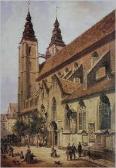
So full and clear and pure:
He poured his faith and love in,
Of that all men were sure.
But of all bells that ever
He cast, was one the crown,
That was the bell for sinners
At Breslau in the town.”


|
“And all his bells they sounded
So full and clear and pure: He poured his faith and love in, Of that all men were sure. But of all bells that ever He cast, was one the crown, That was the bell for sinners At Breslau in the town.” |

|
He was required to cast a bell for the Magdalen Church tower of that city of noble churches, Breslau. He felt that this was opportunity for his masterpiece. All of his thoughts centred on the Magdalen bell.After a long period of preparation, his metals were arranged for use. The form was walled up and made steady; the melting of the metals in the great bell-kettle had begun.
The old bell-founder had two faults which had grown upon him; a love of ale and a fiery temper.
While the metals were heating in the kettle, he said to his fire-watch, a little boy,
“Tend the kettle for a moment; I am overwrought: I must go over to the inn, and take my ale, and nerve me for the casting.
“But, boy,” he added, “touch not the stopple; if you do, you shall rue it. That bell is my life, I have put all I have learned in life into it. If any man were to touch that stopple, I would strike him dead.”
The boy had an over-sensitive, nervous temperament. He was easily excited, and was subject to impulses that he could not easily control.
The command that he should not touch the stopple, under the dreadful penalty, strongly affected his mind, and made him wish to do the very thing he had been forbidden.
He watched the metal in the great kettle. It bubbled, billowed, and ran to and fro. In the composition of the glowing mass he knew that his master had put his heart and soul.
It would be a bold thing to touch the stopple, adventurous. His hand began to move towards it.
The evil impulse grew, and his hand moved on.
He touched the stopple. The impulse was a wild passion now, he turned it.
Then his mind grew dark he was filled with horror. He ran to his master.
“I have turned the stopple; I could not help it,” he said. “The Devil tempted me!”
The old bell-founder clasped his hands and looked upward in agony. Then his temper flashed over him. He seized his knife, and stabbed the boy to the heart.
He rushed back to the foundry, hoping to stay the stream. He found the metal whole; the turning of the stopple had not caused the metal to flow.
The old bell-founder knew the consequences of his act, and he did not seek to escape them. He cast the bell; then he went to the magistrates, and said,
“My work is done; but I am a murderer. Do with me as you will.”
The trial was short; it greatly excited the city. The judges could not do otherwise than sentence him to death. But as he was penitent, he was promised that on the day of his execution he should receive the offices and consolations of the Church.
“You are good,” he said. “But grant me another favor. My bells will delight many ears when I am gone; my soul is in them; grant me another favor.”
“Name it,” said the judges.
“That I may hear the sound of my new bell before I die.”
The judges consulted, and answered,
“It shall toll for your execution.”
The fatal day came.
Toll, toll, toll!
There was a sadness in the tone of the bell that touched every heart in Breslau. The bell seemed human.
Toll, toll, toll!
How melodious! how perfect! how beautiful! The very air seemed charmed! The years would come and go, and this bell would be the tongue of Breslau!
The old man came forth. He had forgotten his fate in listening to the bell. The heavy clang was so melodious that it filled his heart with joy.
“That is it! that is it; my heart, my life!” he said. “I know all the metals; I made the voice! Ring on, ring on forever! Ring in holy days, and happy festivals, and joy eternal to Breslau.”
Toll, toll, toll!
On passed the white-haired man, listening still to the call of the bell that summoned him to death.
He bowed his head at the place of execution to meet the stroke just as the last tone of the bell melted upon the air. His soul passed amid the silvery echoes. The bell rings on.
|
“Ay, of all bells that ever
He cast, is this the crown, The bell of Church St. Magdalen At Breslau in the town. It was, from that time forward, Baptized the Sinner’s Bell; Whether it still is called so, Is more than I can tell.” |